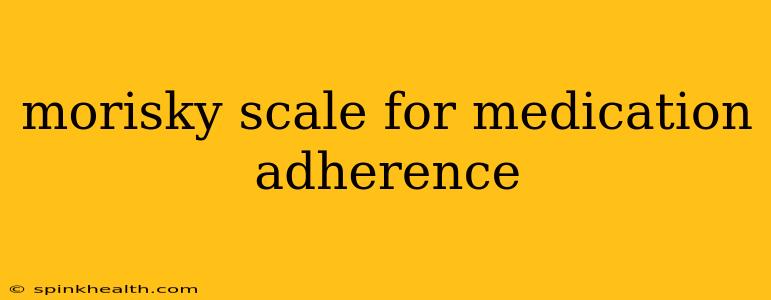Medication adherence—taking your prescribed medications as directed—is crucial for managing many health conditions. But life gets busy, and remembering pills, understanding dosages, or even affording them can be a challenge. That's where the Morisky Medication Adherence Scale (MMAS) comes in. This simple yet powerful tool helps healthcare professionals and patients assess medication adherence. Let's delve into what the MMAS is, how it works, and its importance.
Imagine this: Sarah, a vibrant 60-year-old with hypertension, finds managing her medication a constant struggle. She sometimes forgets to take her pills, and juggling multiple medications can be overwhelming. Understanding her level of adherence is key to optimizing her treatment and overall health. This is where the Morisky scale shines, offering a straightforward assessment of her medication-taking habits.
What is the Morisky Medication Adherence Scale (MMAS)?
The MMAS is a short, validated questionnaire designed to quickly assess how well a patient adheres to their prescribed medication regimen. It's not about judging—it's about understanding the challenges patients face and tailoring support to improve adherence. The scale focuses on patient self-report, making it a practical tool in clinical settings.
How Does the Morisky Scale Work?
The MMAS typically consists of a few simple yes/no questions, focusing on the patient's behaviour related to their medication. A higher score usually indicates better adherence, while a lower score suggests potential issues requiring attention. The exact wording and scoring may vary slightly depending on the version used (e.g., MMAS-4, MMAS-8), but the core principle remains consistent.
What are the Different Versions of the Morisky Scale?
There are different versions of the Morisky scale, each with slight variations in questions and scoring. The most common ones include:
- MMAS-4: This version contains four simple yes/no questions. It's concise and easy to administer.
- MMAS-8: An expanded version with eight questions offering a more comprehensive assessment.
What Questions Does the MMAS Ask? (Examples)
While the exact wording varies slightly across versions, the questions typically revolve around these key aspects:
- Forgetting to take medication: Have you ever forgotten to take your medication?
- Running out of medication: Have you ever run out of your medication before getting a refill?
- Intentionally skipping doses: Have you ever intentionally skipped a dose of your medication?
- Taking medication as prescribed: Do you always take your medication exactly as prescribed by your doctor?
How are the Results Interpreted?
The interpretation of the results depends on the specific version of the MMAS used. A healthcare professional will use the responses to categorize a patient's adherence level. Generally:
- High score: Indicates good adherence.
- Low score: Suggests poor adherence and potential need for intervention.
What are the Benefits of Using the Morisky Scale?
The MMAS offers several advantages:
- Simplicity: It's easy to administer and understand.
- Speed: The assessment takes only a few minutes to complete.
- Patient-centered: It focuses on the patient's perspective.
- Actionable insights: The results provide valuable information for developing tailored adherence strategies.
How Can I Improve My Medication Adherence?
If the MMAS reveals challenges with your adherence, don't worry! There are many ways to improve:
- Pill organizers: Using a pill organizer can help with remembering doses.
- Reminders: Set alarms or use reminder apps on your phone.
- Support systems: Talk to family or friends for support.
- Communication with your doctor or pharmacist: Discuss any concerns or challenges you face.
What are the limitations of the Morisky Scale?
While helpful, the MMAS is not without limitations:
- Self-reporting bias: Patients may not accurately report their medication-taking behaviour.
- Limited scope: It doesn't assess all aspects of adherence (e.g., medication affordability, understanding of instructions).
Is the Morisky Scale used for all medications?
The Morisky Scale is a general tool, applicable to various medications. However, some medications require stricter adherence than others. The MMAS helps highlight areas where adherence may be a concern, regardless of the specific medication.
This information is for educational purposes only and should not be considered medical advice. Always consult with a healthcare professional for any health concerns or before making any decisions related to your health or treatment.

